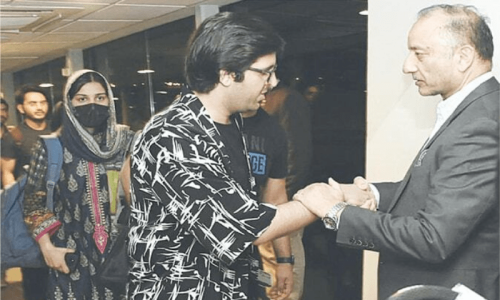
ISLAMABAD: The PPP-PML-N parliamentary committee has so far failed to make tangible progress on economic reforms and could not offer the 'good news' its members had promised last week.
The committee agreed, however, to appoint a single-member judicial commission (a retired judge of a high court or Supreme Court) to investigate the issue of sugar price hike, but could not reach a consensus on the name of the retired judge.
The parliamentary leaders of the two parties, headed by Finance Minister Dr Abdul Hafeez Shaikh and Senator Ishaq Dar, agreed on Wednesday to hold meetings over the next few days of a number of sub-committees on inflation, loan write-offs, gas and electricity loadshedding, oil pricing, accountability law and independent election body and take up their recommendations for discussion on Monday.
The main features of the meeting were a presentation by State Bank Governor Shahid H. Kardar of two lists of Rs281 billion loans written off since 1971 and a demand by provincial chief secretaries for the revival of the market magistracy system for price control.
Mr Kardar told reporters that the first list of loan write-offs pertained to the period between 1971 and 2002 while the second from 2003 to 2009, but added that it was difficult to ascertain how many loans were written off on political considerations.
He said that after 2003 only 11 per cent loans were written off by public sector banks and 48 per cent by foreign banks. He said about 95 per cent of the total write-offs involved the amount less than Rs500,000.
The SBP chief said the overall government borrowing from the central bank stood at about Rs1,382 billion, which would have to be rolled back in five years.
He said the government borrowing had been brought down from about Rs324 billion to Rs155 billion and efforts were being made to reduce it further.
Ishaq Dar, who heads the PML-N team, said that about Rs66 billion of loans had been written off by the public sector banks.
He said the committee had asked the State Bank to come up with a break-up of loans for different periods and the conditions under which these were written off.
Dr Hafeez said that negotiations on economic reforms were progressing well and the two sides were contributing with commitment and sincerity.
He said that recommendations made by the chief secretaries for price control would be finalised by Senator Raza Rabbani for consideration of the parliamentary committee on Monday.
The finance minister said the sub-committee on oil pricing formula, headed by Petroleum Minister Syed Naveed Qamar, and that on gas and electricity loadshedding, headed by Water and Power Minister Raja Pervez Ashraf, would finalise their recommendations on Thursday.
He said that based on different point of views, the accountability law and procedure for appointment of the chief election commissioner would be discussed at the next meeting.
Thirty per cent cut He said the committee did not take up proposals for a 30 per cent reduction in government expenditures because of paucity of time.
Ishaq Dar said the two sides had agreed last week to come up with measures for the 30 per cent cut in non-salary and non-security expenditures both at the federal and provincial levels.
He said the Punjab government had reduced its non-salary expenditure by Rs6 billion by merging seven departments out of a non-salary and non-security expenditures of Rs30 billion, but this was not taken up for discussion by the committee.
Both Dr Hafeez and Ishaq Dar declined to comment on what would be the fate of oil price revision, which is due on Jan 31.
The petroleum ministry has already told the sub-committee on oil pricing that if the prices are not increased in line with the international trend, the government will have to absorb a revenue loss of Rs13 billion in three months — Rs1.4 billion in December last year, Rs5 billion in January and Rs6.5 billion in February.
In their initial feedback, parliamentary members of the PML-N and the MQM have opposed the increase in oil prices.














































Dear visitor, the comments section is undergoing an overhaul and will return soon.